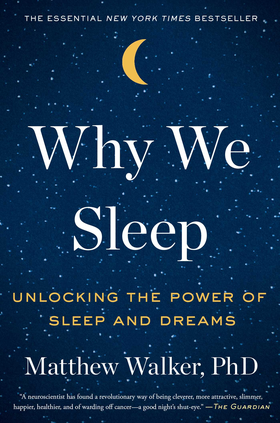Why We Sleep
Snake Oil has nothing on a good night sleep

If you're anything like me, the fundamental processes all living organisms need to sustain life do not come naturally to us. Things like knowing when to eat food, drink fluids, or just sleeping are often completely forgotten when our mind finds something else to occupy its time. It's this intense focus that allows me to characterize my relationship with sleep as quarrelsome.
After reading Matthew Walker's book, Why We Sleep, it's easy see the damage my adversarial relationship with sleeping causes. Walker, who is the director of the Human Sleep Science Center in UC Berkeley, lists some of the immediately recognizable symptoms from the aftermath of pulling an "all-nighter". In the short term, sleep deprivation destroys your creativity, problem solving, and decision-making skills, along with inhibiting your memory and your ability to learn. Chronic lack of sleep also has long term side-effects, devouring your heart, brain, and mental health, along with your emotional well-being, immune system, and ultimately your life span.
Throughout the book Walker does a great job of describing the why and how sleep can be such a cure-all for so many ailments, and why 8 hours in bed does not equal 8 hours of sleep. The goal of sleep is to bathe our brain in the restorative neurochemials generated by the different Rapid-Eye Movement (REM) and Non-Rapid-Eye Movement (NREM) stages of sleep. The 8 hour minimum suggested by doctors ensures you spend enough time in each stage to receive their full effect. If you (like me) have trouble sleeping throughout the night, you need to spend more than 8 hours in bed, giving your brain more opportunities to cycle through the different stages of sleep. He goes on to explain the importance of each stage of the sleeping process and why you will never be able to "catch up" from all the lost sleep on the weekend. A popular myth I had believed all throughout my college years.
Walker also does an amazing job describing the various systems our brain uses to control the many functions that regulate our lives, including when to sleep. My favorite section dealt with our Circadian Rhythm and how it changes as we age. Walker argues that teenagers, notorious for sleeping in, might have their brain chemistry to thank. Our circadian rhythm is a ancient internal time keeping process in our brain that regulates many things like our moods, emotions, urine output, core body temperature, metabolic rate, and numerous other hormones. As we age, our circadian rhythm adjusts as our brain develops, until we finally reach the typical split between morning people (morning larks) and evening dwellers (night owls).
For teenagers, as their brains continue to develop, their circadian rhythms are skewed to the evening, allowing them to naturally stay awake and alert throughout much of the night. This will make it almost impossible for them to wakeup before the irresponsibly set 7am school starting bell with a full 8 hours of much needed sleep. Walker describes this situation as if a fully grown adult where to go to bed at 5 or 6pm, and frustratingly try to sleep only to be woken at 1 or 2am.
Overall, Matthew Walker did an amazing job creating an enjoyably short introduction into the world of sleep science. Our brains are such a complex part of our body that we are only just beginning to understand. I thoroughly enjoyed reading this book, and I'm sure you will to.